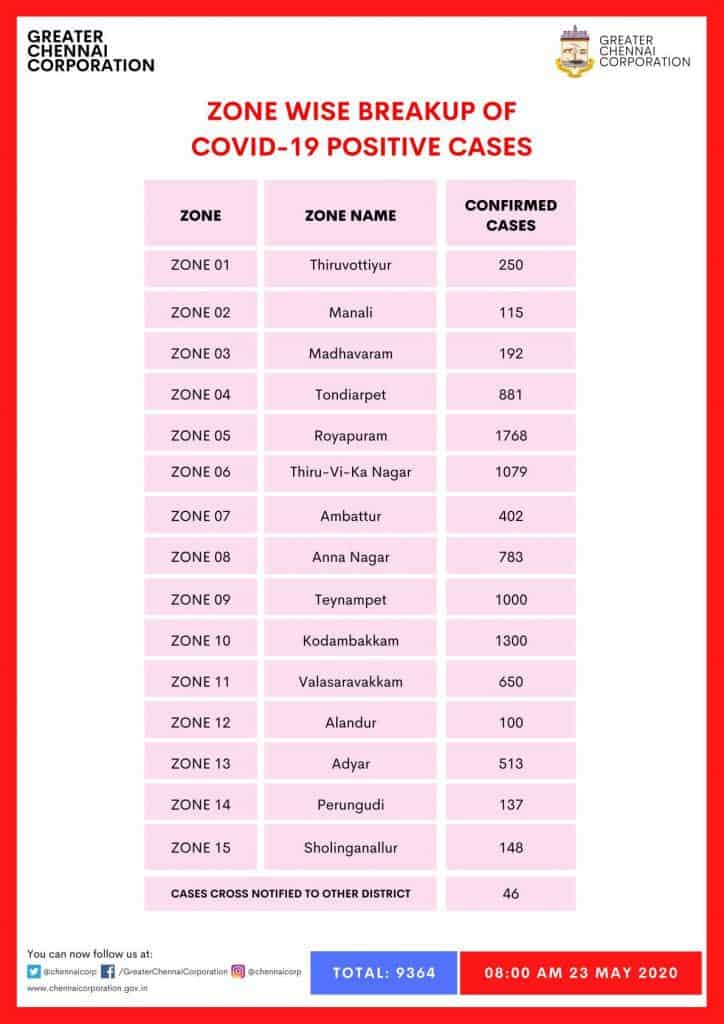COVID-19: Volunteers deployed in slums, Stanley Hospital docs contract COVID, trains from Chennai cancelled
On May 22nd, Tamil Nadu recorded 786 fresh COVID-19 cases, taking the total to 14,753, according to the state health bulletin. Chennai continues to be the hotspot in the state, as 569 cases out of the 786 belong to the city. There are 5,461 active cases in Chennai, while 3,791 patients have recovered; 66 succumbed to the disease. Cracking down on violators who do not wear masks when they step out, the city police is levying a fine of Rs 500.

In a bid to control the spread of the disease in slums in Chennai, the Greater Chennai Corporation (GCC) has deployed a 2,500-strong force in 1,979 non-notified slums in the city. Volunteers with various NGOs in the city are part of the force who will visit the settlements to create awareness about dos and don’ts. According to the civic body, every volunteer will be tasked with monitoring and collecting data from 300 houses and will look for residents stepping out to buy essentials and to the public toilets and counsel them to follow physical distancing at all times. As part of the civic body’s micro-level containment plan, 500 sanitary inspectors will be appointed.
In what comes as a major blow to the state government, according to Stanley Government Hospital Dean Dr Balaji, around 4-5 doctors at the hospital in Chennai have tested positive. However, sources within the hospital state that at least 15 doctors are found to be positive. The sources add that the doctors, aged above 50, were involved in administrative work.
The Indian Railways has cancelled trains from Chennai to other states as the city is reporting more cases every day. The department had initially planned to run four trains to Chennai – two trains from Delhi and Howrah each. However, the decision was cancelled as the CM appealed to the Railways not to operate trains.
As the number of cases continues to rise in Chennai and neighbouring districts – Chengalpet, Thiruvallur and Kanchipuram, the State government rejigged the Field Support Team. The 15 zones in Chennai will have an IAS and IPS officer and a senior officer to ensure the effective containment zone management, focused testing, effective contact tracing, isolation and quarantine management for preventing the further spread of disease. Dr J Radhakrishnan continues to be the Special Nodal Officer for Chennai, he will be assisted by an IPS officer.
Incidents of asymptomatic contacts of patients not being tested is causing fear among people in Chennai. A COVID-positive patient from Anna Nagar stated that his mother has not been tested despite their insistence. Experts attribute it to the expensive kits and the need to prioritise according to need.
In a bid to disseminate COVID information, the Chengalpattu district administration released a map of COVID-19 patients in its district. However, it was found that the map gives out the personal details of the patients when selecting a pin on the map. As a result of this, several patients received harassing phone calls. Acting on it, the district administration withdrew the map.
Source: The Hindu | The Times of India | The New Indian Express | The News Minute
Metrowater faces loss
As the city continues to be locked down, Chennai Metrowater Supply and Sewerage Board (CMWSSB) faces a sharp dip in revenue. In the last three months, the board earned ₹91 crore whereas it collected ₹201 crore last year during the same period. The agency stated that it has collected only about ₹11 crore in May as against nearly ₹50 crore earned as revenue during May 2019. Besides tax collection, the dip in industrial and commercial usage has also contributed to the loss.
CMWSSB is one of the stakeholders in a study initiated by the World Bank on COVID-19 impact on urban water utilities. The study is aimed to look at the issues impacting water usage in India during the pandemic, financial aid to the water boards and how World Bank can help them address the financial concerns.
The water board sought Rs 25 crore from the state disaster response fund for its fight against COVID-19.
Source: The Hindu
Pollution goes up in the city
The pollution levels came down in Chennai and air quality improved when the nationwide lockdown came into force two months ago. However, as the state government relaxed the rules, the pollution levels have begun to rise in the city.
Data furnished by the Tamil Nadu Pollution Control Board (TNPCB) indicates that the air quality levels in the city have crossed the permissible limit of 60 microgram/m3. On May 19th, the level of PM 2.5 in Gumidipoondi was 94 microgram/m3, Royapuram 62 microgram/m3, Perungudi 60 microgram/m3 and Manali 85 microgram / m3.
As major hospitals are situated in the vicinity of Cooum River, even two months of lockdown and closure of industrial units has not helped reduce water pollution in the river. Officials from the Public Works Department (PWD) state that the pollution will ease only when the medical waste discharged from the hospitals are controlled.
The officials add that CMWSSB should set up sewage treatment plants (STP) even for hospitals for controlling waste being discharged into water channels. According to the department, the pollution in Adyar River has reduced by an estimated 40 per cent as industries are the reason behind heavy pollution of the river.
Source: DTNext
Compiled by Bhavani Prabhakar